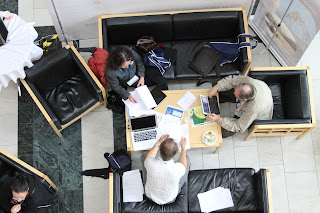Steve Wheeler may have had a monopoly on interviewing keynote speakers but I have had all the luck with fortuitous meetings: coffee with Anna Kirah at her inspirational Making Waves office; conference dinner with Marci Powell; and a delayed flight with Sugata Mitre.
As it happens, I also bumped in to Steve Wheeler on the stairwell and asked whether he'd thought of interviewing an EDEN Young Scholar to provide contrast with what must therefore be EDEN's Old Scholars. Of course, this is the stupidest thing I've said all week considering that I'm terrified of being in front of a camera and, naturally, interviewing me was the first thing that Steve suggested. Conveniently, I had a flight to catch but, Steve, with a little more bravery and time on my side, these are some of the things that I might have said:
My main takeaway from EDEN 2013: The education system of today is not moving quickly enough to prepare for the incoming generation of tomorrow. If you haven't gathered by now, I have two pre-school children. In the context of this blog, they represent the incoming generation and I am driven by their cause. Against this background, my conversations with Anna, Marci and Sugata have exploded like Hiroshima in my brain. When I search through the rubble, I'm not sure how many old notions still have relevance in the new reality that is reconstructing before me. It's like I've woken up in a Carlsberg advert: Probably the best education in the world.
In their own ways, each challenged me to think about what school adds to children's lives. This is not the same as challenging the benefits of learning. In other words, are school and learning synonymous. I think not. We talk about 'lifelong learning' and I'd like to coin the phrase 'daylong learning'. I pose this notion to (working and not working) parents who find it convenient when learning is contained in the school day and does not interfere very much with mornings, evenings, weekends and holidays. As Sir Ken Robinson said, a key driver for education is to enable children to become economically independent. When a wealthy parent gifts their children money, this promotes economical dependence. In resistance to this model, I gift my role as home learning facilitator.
Now, as it turns out, home learning facilitators have plenty to consider. During a discussion about Sugata's Ted Prize-funded literacy experiment in India, he asked how my 4 year old learned to read. I started singing the praises of Ruth Miskin's phonetic system known as Read Write Inc when Sugata announces, "This phonetics stuff does not sit well with me". I'm thinking this guy is crazy but then we talk more. I lamented on my experiences of traveling in Kalimantan, Arnhem Land, Aceh and Laos. In all these places, children are fluent in Pop English: "David Beckham, I love Manchester United!" and "Britney Spears is so pretty!". By the time we boarded our flight, I comprehended the significant value of Sugata's point: Do we really need to teach children to read?
Sugata's emerging philosophy is self-organized learning. If we leave four children in a group with a Manchester United shirt and a Britney Spears poster, can this not be the start of a decoding game? I am left wondering whether decoding could be an enjoyable part of the literacy journey through which children could develop a suite of additional life skills. Furthermore, it is not beyond comprehension that children born in to the lucky sperm club could soon be Sugata's under privileged children in India. With a projected 1.8 billion additional people on the planet by the year 2050, I wonder whether there will be enough space to build a school for my grandchildren or enough teachers to attend adequately to every pupil. It has dawned on me to the extent that Sugata's self-organized education is visionary.
If Steve Wheeler was to ask me what EDEN 2013 has changed, I would say that I've left silos in the rubble. When Marci described an eight year old and a fifteen year old learning together on a bench, I realized that too much emphasis is placed on primary, secondary and tertiary silos. Likewise, when she explained how Polycom technology enables a classroom of kids in Wales to take a virtual field trip to Te Papa Museum in New Zealand, I realized that the transition between physical and virtual learning worlds needs to become a lot more agile; the new normal. In other words, last week, I was looking in pigeon holes for answers; this week I'm looking at the approaching tsunami wave in the sky. I guess that's what Luskin meant by focussing on the doughnut and not the hole.
On an office door at Making Waves is the quote: The best way to predict the future is to create it. Anna Kirah and Marci Powell have engaged me in this challenge. So, Steve, in response to the question, "what next?", I need to figure my way to help create this future that is unrestrained by archaic boundaries. I have the privilege of a scholarship at the University of Bristol to undertake doctoral research and I aim to do something small but significant towards this goal. One thing for certain is that Anna Kirah has given me the confidence to pursue the people-centered approach, which aligns strongly with my professional experience to-date. On Anna's business card it reads 'Chief Experience Officer'. I think that I would like mine to read 'Learning Experience Officer'.



.JPG)
.JPG)
.JPG)
.JPG)





